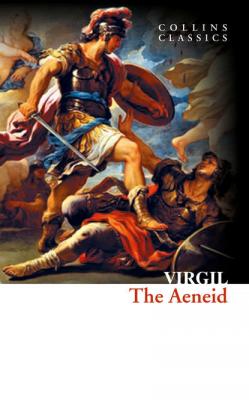The Aeneid. Публий Марон Вергилий
Читать онлайн.| Название | The Aeneid |
|---|---|
| Автор произведения | Публий Марон Вергилий |
| Жанр | Классическая проза |
| Серия | |
| Издательство | Классическая проза |
| Год выпуска | 0 |
| isbn | 9780007535293 |
To seek a refuge in remote abodes.
Last, to support her in so long a way,
He shows her where his hidden treasure lay.
Admonish’d thus, and seiz’d with mortal fright,
The queen provides companions of her flight:
They meet, and all combine to leave the state,
Who hate the tyrant, or who fear his hate.
They seize a fleet, which ready rigg’d they find;
Nor is Pygmalion’s treasure left behind.
The vessels, heavy laden, put to sea
With prosp’rous winds; a woman leads the way.
I know not, if by stress of weather driv’n,
Or was their fatal course dispos’d by Heav’n;
At last they landed, where from far your eyes
May view the turrets of new Carthage rise;
There bought a space of ground, which (Byrsa call’d,
From the bull’s hide) they first inclos’d, and wall’d.
But whence are you? what country claims your birth?
What seek you, strangers, on our Libyan earth?”
To whom, with sorrow streaming from his eyes,
And deeply sighing, thus her son replies:
“Could you with patience hear, or I relate,
O nymph, the tedious annals of our fate!
Thro’ such a train of woes if I should run,
The day would sooner than the tale be done!
From ancient Troy, by force expell’d, we came—
If you by chance have heard the Trojan name.
On various seas by various tempests toss’d,
At length we landed on your Libyan coast.
The good Aeneas am I call’d—a name,
While Fortune favor’d, not unknown to fame.
My household gods, companions of my woes,
With pious care I rescued from our foes.
To fruitful Italy my course was bent;
And from the King of Heav’n is my descent.
With twice ten sail I cross’d the Phrygian sea;
Fate and my mother goddess led my way.
Scarce sev’n, the thin remainders of my fleet,
From storms preserv’d, within your harbor meet.
Myself distress’d, an exile, and unknown,
Debarr’d from Europe, and from Asia thrown,
In Libyan desarts wander thus alone.”
His tender parent could no longer bear;
But, interposing, sought to soothe his care.
“Whoe’er you are—not unbelov’d by Heav’n,
Since on our friendly shore your ships are driv’n—
Have courage: to the gods permit the rest,
And to the queen expose your just request.
Now take this earnest of success, for more:
Your scatter’d fleet is join’d upon the shore;
The winds are chang’d, your friends from danger free;
Or I renounce my skill in augury.
Twelve swans behold in beauteous order move,
And stoop with closing pinions from above;
Whom late the bird of Jove had driv’n along,
And thro’ the clouds pursued the scatt’ring throng:
Now, all united in a goodly team,
They skim the ground, and seek the quiet stream.
As they, with joy returning, clap their wings,
And ride the circuit of the skies in rings;
Not otherwise your ships, and ev’ry friend,
Already hold the port, or with swift sails descend.
No more advice is needful; but pursue
The path before you, and the town in view.”
Thus having said, she turn’d, and made appear
Her neck refulgent, and dishevel’d hair,
Which, flowing from her shoulders, reach’d the ground.
And widely spread ambrosial scents around:
In length of train descends her sweeping gown;
And, by her graceful walk, the Queen of Love is known.
The prince pursued the parting deity
With words like these: “Ah! whither do you fly?
Unkind and cruel! to deceive your son
In borrow’d shapes, and his embrace to shun;
Never to bless my sight, but thus unknown;
And still to speak in accents not your own.”
Against the goddess these complaints he made,
But took the path, and her commands obey’d.
They march, obscure; for Venus kindly shrouds
With mists their persons, and involves in clouds,
That, thus unseen, their passage none might stay,
Or force to tell the causes of their way.
This part perform’d, the goddess flies sublime
To visit Paphos and her native clime;
Where garlands, ever green and ever fair,
With vows are offer’d, and with solemn pray’r:
A hundred altars in her temple smoke;
A thousand bleeding hearts her pow’r invoke.
They climb the next ascent, and, looking down,
Now at a nearer distance view the town.
The prince with wonder sees the stately tow’rs,
Which late were huts and shepherds’ homely bow’rs,
The gates and streets; and hears, from ev’ry part,
The noise and busy concourse of the mart.
The toiling Tyrians on each other call
To ply their labor: some extend the wall;
Some build the citadel; the brawny throng
Or dig, or push unwieldly stones along.
Some for their dwellings choose a spot of ground,
Which, first design’d, with ditches they surround.
Some laws ordain; and some attend the choice
Of holy senates, and elect by voice.
Here some design a mole, while others there
Lay deep foundations for a theater;
From marble quarries mighty columns hew,
For ornaments of scenes, and future view.
Such is their toil, and such
